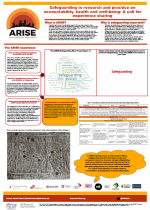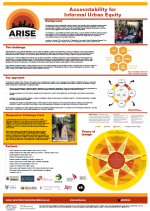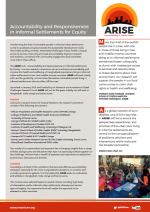We’re thrilled to announce the publication of our colleague Professor Sabina Faiz Rashid’s book Poverty, Gender and Health in the Slums of Bangladesh: Children of Crows. Sabina is the Mushtaque Chowdhury Chair in Health and Poverty at BRAC’s James P Grant School of Public Health and ARISE PI in Bangladesh, and has written about the […]
This poster outlines the approach that ARISE has taken to creating a safeguarding policy and associated management systems. For ARISE, safeguarding concerns are not limited to sexual abuse and exploitation, but include physical and psychological abuse, exploitation and neglect. Vulnerable people are those who may be at risk of abuse or neglect due to the […]
This poster provides an introduction to ARISE and covers the challenges that we are seeking to overcome as well as the methods that we will employ in our research. The poster includes a diagram that outlines the ‘Theory of Change’ that we are working to. [pdf-embedder url=”http://www.ariseconsortium.org/wp-content/uploads/2019/10/ARISE-overview-poster-.pdf” title=”ARISE overview poster”] Download poster
This short documentary provides an insight into life in Dhaka. It was produced by our members BRAC JPG School of Public Health in Dhaka. The film highlights issues such as environmental pollution, housing, sanitation and poor access to health services that can limit residents ability to remain healthy. It also outlines some of the positive […]
The UKRI GCRF Accountability for Informal Urban Equity Hub is a multi-country Hub with partners in the UK, Sierra Leone, India, Bangladesh and Kenya which we call ARISE. The Hub works with communities in slums and informal settlements to support processes of accountability related to health. It is funded through the UKRI Collective Fund. This […]
If you need a quick introduction to the consortium please do browse our leaflet which explains more about the countries we are working in, the challenges we are facing, and our approach. [pdf-embedder url=”http://www.ariseconsortium.org/wp-content/uploads/2019/02/ARISE-leaflet.pdf” title=”ARISE leaflet”] Download





